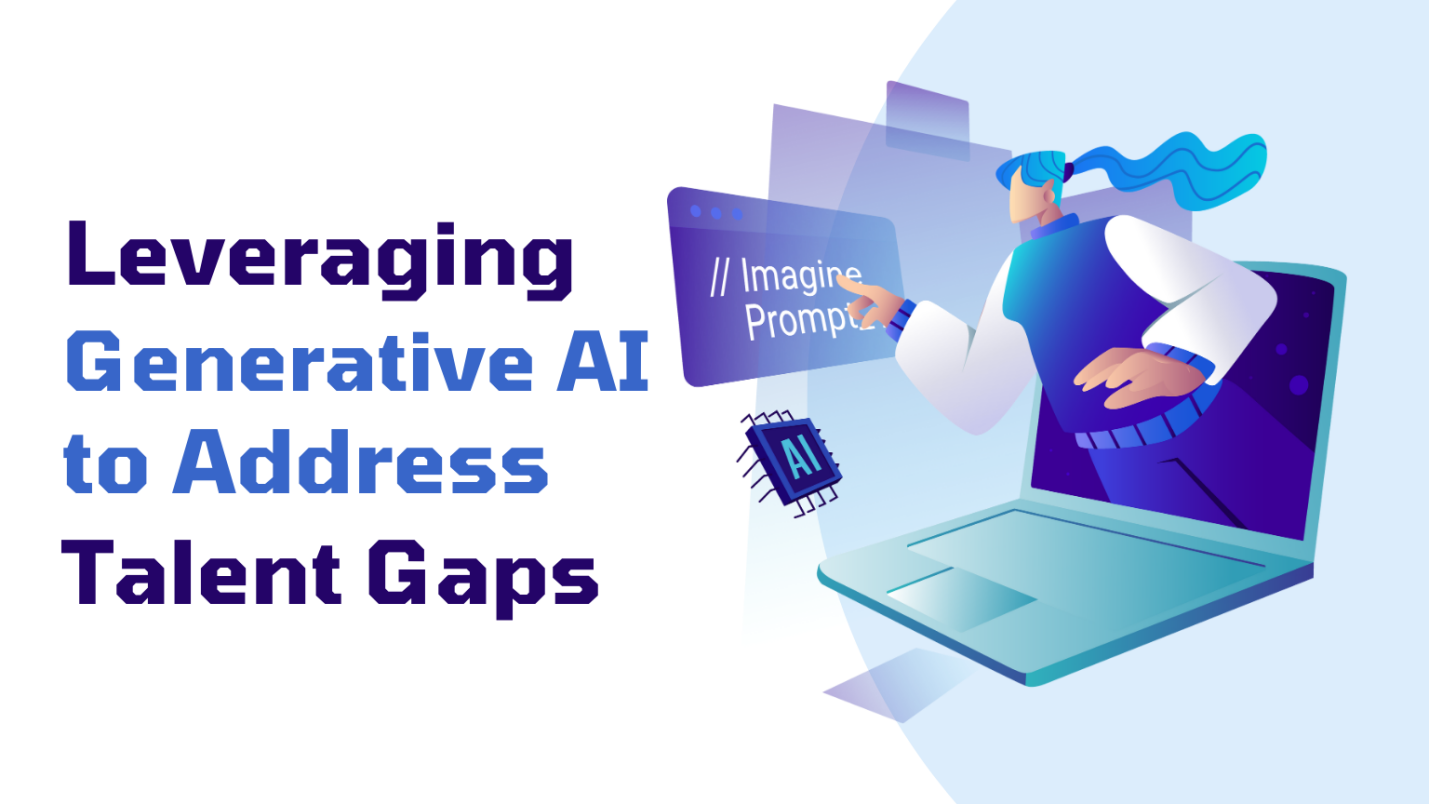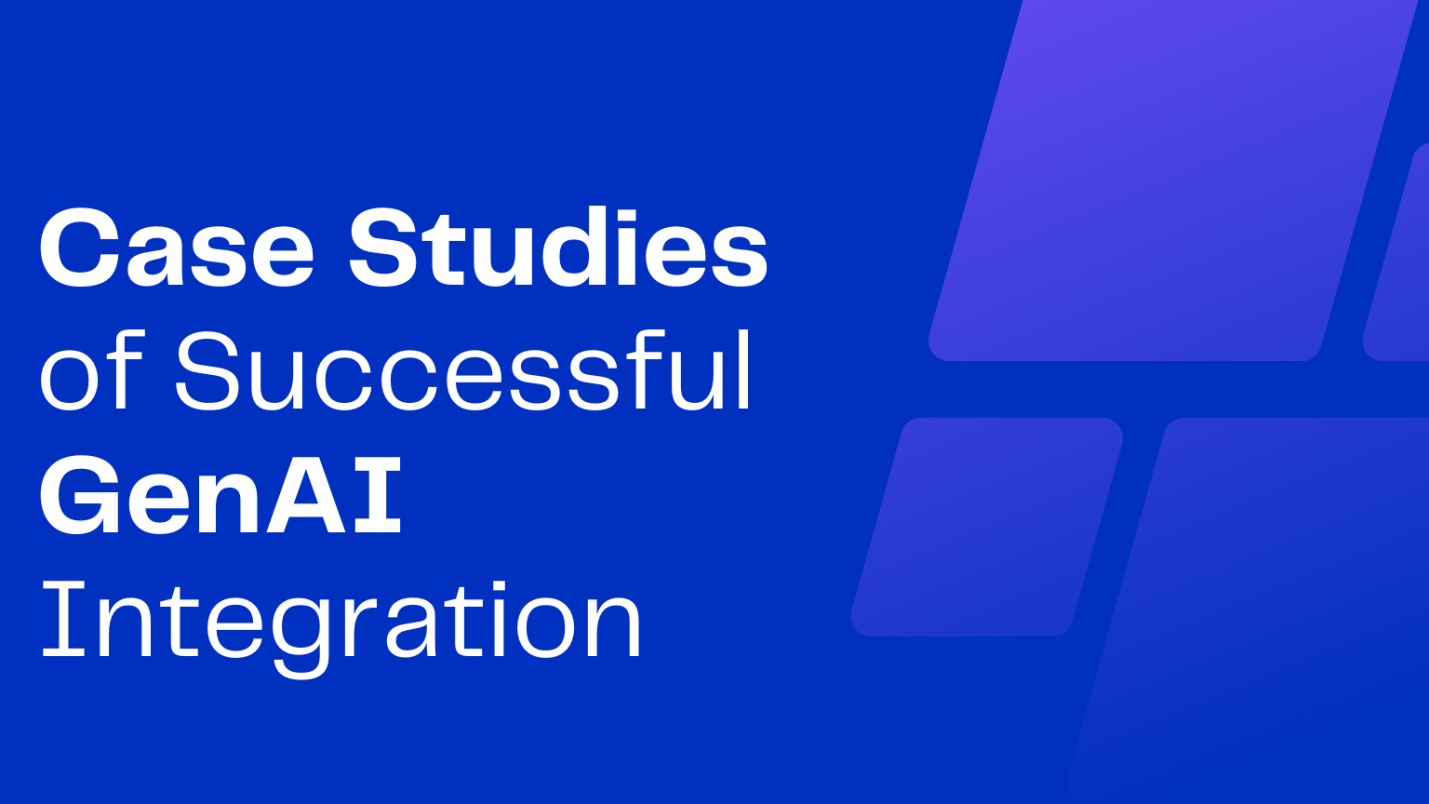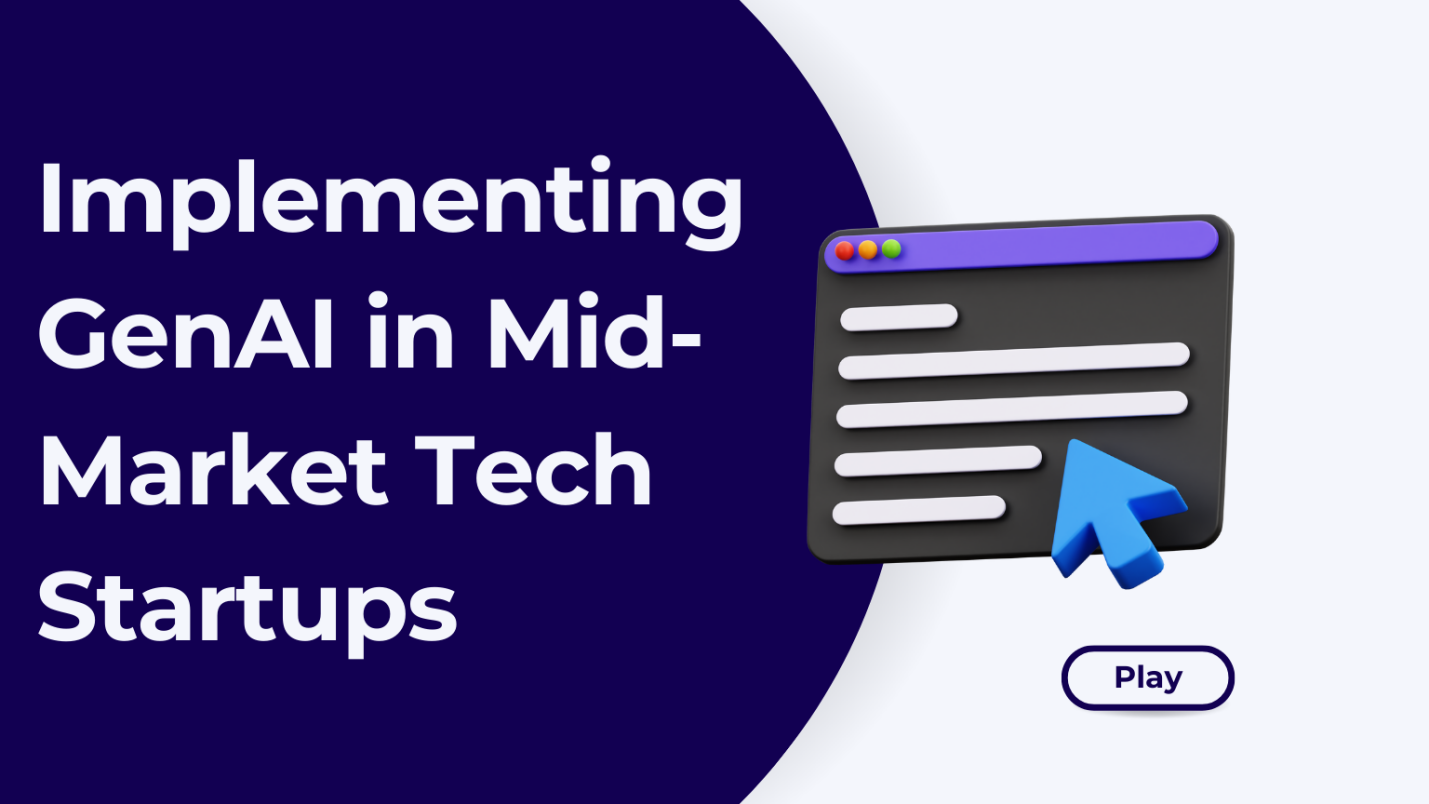Resolving Talent Gaps and Scaling Challenges Using Generative AI for Mid-Market Tech Startups

The mid-market tech startups face substantial challenges in talent acquisition and scaling.
The biggest issues are always with regard to attracting and retaining skilled professionals. It is also because such companies compete with the bigger corporations offering more lucrative remunerations and extended resources.
Such issues sometimes prolong the recruitment process and operational costs. Also, scaling operations efficiently requires robust infrastructure and adapts to processes. Such things are resource-intensive and challenging for implementation.
Generative AI (GenAI) refers to the power of AI in the creation of content, such as text, images, or music, by mastering patterns from existing data. This technology holds transformative potential across all sectors, including the tech industry.
It can address some operational challenges of mid-market tech startups by automating routine tasks, enhancing decision-making processes, and fostering innovation.
Incorporating GenAI into commercial activities frees up and streamlines workflows, reduces the burden on human resources, and allows scale-ups and start-ups to scale more effectively.
For example, automating customer service interactions or generating code snippets frees valuable time for employees to focus on strategic initiatives. In addition, GenAI can help in analyzing data that informs business decisions. This drives growth.
Understanding Talent Gaps in Mid-Market Tech Startups

However, integration of GenAI provides challenges such as the requirement of high initial investment and a need for technical expertise to implement or maintain AI systems.
At the same time, despite these drawbacks, GenAI presents with benefits that make it a strong contender for mid-tech startups to address talent acquisition and scaling problems.
Common Talent Shortages:
- Data Science: The demand for data scientists is shooting up, but the supply is still thinly spread. Startups struggle to find professionals who can wring actionable insights from complex datasets, a skill critical for informed decision-making and strategic planning
- Machine Learning: Implementing machine learning models requires specific knowledge. The lack of professionals in this area hinders the development of smart systems that can learn and improve in startups, which plays an essential role in innovation and efficiency.
- Software Development: Strong software developers are critical for building and maintaining strong applications. The competition for such talent is very competitive, which makes it tricky for startups to grab and retain such developers.
Impact on Growth:
These talent gaps can have several adverse effects on startups:
- Innovation Stagnation: Lack of expertise might prevent a startup from innovating, with subsequently fewer new products or services to then differentiate them in the market.
- Delayed Product Development: Technical skills may be insufficient, and development cycles delayed, which can cause delays in the launch and possibly missed opportunities.
- Reduced Market Competitiveness: With limited skills available, adopting newer technologies would be difficult and make mid-market tech startups lag behind other companies who can avail the new technologies properly.
Key talent gaps must be addressed by mid-market tech startups looking to continue their expansion and preserve market competitiveness. Such strategies could include employee training, staff augmentation services, and a culture of continuous learning to help manage these challenges.
Mid-market tech startups face unique scaling challenges that may hinder their development and market expansion.
Scaling Challenges Specific to Mid-Market Tech Startups
Operational Bottlenecks:
As startups grow, they may face several operational hurdles:
- Process Inefficiencies: Improperly managed expansion, unclear tasks, and undefined lines of authority can contribute to low productivity with elements of errors.
- Resource Constraints: Limited monetary and human resources limit a startup’s capacity to spend on relevant tools, technologies, or talent, thus limiting scalability.
- Infrastructure Limitations: Current infrastructures might not accommodate increased workloads, and performance can degrade and possibly cause downtime.
Market Expansion Difficulties:
Entering new markets and managing growth present additional challenges:
- New Market Entry: Understand and adapt to new environments, including regulatory, cultural and competitive landscapes, which is quite challenging, highly researched, and planned strategically.
- Increased Customer Demands: Scaling introduces a larger customer base with variable needs and creates the need for better customer support and individualized services.
- Maintaining Service Quality: Maintaining the quality of service or product during the rapid growth process is necessary to gain confidence and satisfaction from the customers
Addressing these challenges demands strategic prioritizing in investments made for scalable infrastructure, process optimization, and understanding of new market dynamics. Taking proactive management of these factors allows mid-market tech startups to navigate the intricacies of scaling and achieve sustainable growth.
Some mid-market tech startups are facing the challenge of acquiring and retaining specialized talent, which can go against growth and innovation. With Generative AI, it provides possibilities such as automation, better recruitment, and employee development in filling these talent gaps.
Leveraging Generative AI to Address Talent Gaps

Automating Routine Tasks:
GenAI is awesome at automating mundane and time-consuming tasks, so existing staff can focus on strategic work. As an example, AI-based tools can auto-suggest data input, report generation, or potential customer inquiries.
This would not only enhance the organizational efficiency but also have employees concentrate on complex problem-solving and innovation to create a more dynamic and productive workplace.
Enhancing Recruitment Processes:
Integration of AI-driven tools in this recruitment landscape is streamlining hiring procedures. For instance, these tools can analyze millions of candidate pools, assess qualifications and even predict job performance, greatly reducing the time and resources allocated for recruiting. By adopting AI, startups can much more effectively discover and attract potential employees best fitted for organizational needs.
Upskilling and Reskilling Employees:
The fast-growing tech industry places an important emphasis on continuous employee development. In such environments, personalized learning platforms shaped with artificial intelligence can offer well-placed customized learning programs that respond to their unique learning preferences and pace.
These platforms are likely to identify competency gaps in skill areas through targeted content, ensure effective upskilling and reskilling for the employees, and thereby enhance retention through investment in their growth.
Mid-market tech startups integrate GenAI into their operations to solve talent shortages, optimize recruitment, and foster a continuous learning culture in order to position themselves for sustained success in this competitive landscape.
Mid-market tech startups mostly face challenges in scaling, which impacts growth as well as operational efficiency. Solutions to these bottlenecks can be achieved in the business operation through GenAI integration, with the help of process optimization, improved customer experience, and fact-based decision-making processes.
Utilizing Generative AI to Overcome Scaling Challenges
Process Optimization:
GenAI can deeply analyze complicated business processes to find inefficiencies and areas for enhancement. It can demonstrate quick insights through the analysis of workflows, resource usage, and operation bottlenecks by AI systems that streamline operations.
For example, process optimization through AI can eliminate mundane tasks, minimize errors, increase productivity, and facilitate a rapid expansion of startups.
Customer Service Enhancement:
Implementing AI-driven chatbots and virtual assistants allows startups to manage customer interactions at scale. These AI tools handle inquiries, provide support, and offer personalized experiences around the clock.
By automating responses to common questions and efficiently routing complex issues to human agents, AI enhances customer satisfaction and reduces response times. This scalability ensures consistent service quality as the customer base grows.
Data-Driven Decision Making:
GenAI processes massive amounts of data to derive meaningful conclusions and will analyze market trends, customer behavior, and operating statistics.
AI can provide startup companies with data-driven recommendations on strategic decisions regarding product development, marketing strategies, and resource allocation, helping them be agile and competitive in the market.
Case Studies of Successful GenAI Integration

Implementation of Generative AI helps position mid-market tech startups to reduce the scales, optimize processes, improve customer service, and inform business decisions-all essential tenets of sustainable growth.
Integrating GenAI enabled middle-market tech companies to address talent shortages, accelerate product development, and expedite operations for successful scaling and further market expansion.
Case Study 1: Otter.ai’s AI-Driven Transcription Services
Founded in 2016, Otter.ai had developed AI-driven transcription services to enhance productivity by summarizing meetings and offering content searches.
Using troves of data for training, the company had come up with AI avatars that could attend meetings on behalf of users, essentially filling talent gaps in note-taking and meeting management.
The innovation spelt accelerated product development and a user base of about 20 million, placing Otter.ai favourably against Google.
Case Study 2: ProRata.ai’s AI-Powered Compensation Model
ProRata.ai released in January 2024 an AI-driven method to give back half of the revenues drawn through subscriptions to content creators. With such an initiative, the company secured agreements with major UK publishers like DMG Media, the Guardian, and Sky News as part of a funding round that valued it at $130 million.
The firm scaled its services successfully and entered new markets by putting in more AI solutions for streamlining the operations while addressing the concerns of the media industry regarding the misuse of AI with content.
Best Practices for Implementing GenAI in Mid-Market Tech Startups

These case studies show how mid-market tech startups use Genai to overcome talent shortages, product development, and process efficiencies to scale successfully and expand into new markets.
Best Practices in Implementing Generative AI in Mid-Market Tech Startups
Mid-market tech startups can tap innovative efficiency to drive innovation and operational efficiency. Here are some best practices for ensuring successful implementation:
1. Assessing Organizational Readiness:
- Technology Infrastructure: Analyze the existing systems to assess if they meet the requirements for supporting AI applications. This includes analysis for data storage, processing capability, and network infrastructure. Upgradation may be needed to handle AI workloads efficiently.
- Workforce Competency: Make an assessment of your workforce to identify if there are areas that lack knowledge about AI. There should be training programs invested in upskilling employees so they can work with AI tools effectively.
- Data Preparedness: Ensure you have high-quality data that is relevant for application, as AI models rely on sizeable datasets to be developed and functioned.Robust Data Management Practices Ensure the integrity and accessibility of data.
2. Selecting Appropriate AI Tools:
- Alignment with Business Objectives: Select AI applications that inherently help solve your specific problems and goals. It will ensure that the technology brings concrete benefits to operations.
- Scalability: Select AI solutions that can scale with your company, supporting more data and higher user loads while still delivering high performance.
- Vendor Support and Community: Choose AI solutions that have solid support from their vendors as well as an active user community. This gives access to additional resources, updates, as well as troubleshooting support, which aids in easier implementation and management.
3. Ensuring Ethical AI Use:
- Transparency: Clear communication on how AI decision-making processes work helps stakeholders trust the system and scrutinise the AI-driven processes.
- Fairness: Regular auditing of models to identify and correct biases in AI, which treats every user group equitably. The use of fairness always averts discrimination.
- Accountability: Set up accurate procedures for tracking the performance of AI and resolving incidents. Appoint people as part of the team accountable to oversee AI activities and their conformity to ethical standards.
Through such best practices, mid-market tech startups can ensure proper integration of GenAI into their processes, effectively utilizing the strengths of GenAI while maintaining ethics and furthering business visions.
Mid-market tech startups are faced with various complex challenges while implementing Generative AI, including complexities in integration, resistant employees, and data privacy. Effective methods to address such issues are vital to the adoption of AI.
Potential Challenges and Mitigation Strategies
Integration Complexities:
The technology for AI can be difficult to integrate with the existing infrastructure as there are often compatibility issues, and even the systems need modification in certain scenarios. To overcome these complications:
- Conduct a Comprehensive Assessment: Examine existing systems to spot potential barriers for integration. This analysis allows the identification of changes needed to ensure a seamless AI integration.
- Adopt Middleware Solutions: Middleware fills in gaps between AI application systems to allow a lesser-overhaul integration with original systems.
- Implement Phased Integration: Introduce AI components incrementally and allow sufficient time to troubleshoot issues and refine processes, thus reducing disruption to processes.
Employee Resistance:
Employees may be resistant to AI adoption out of fear that they will lose their jobs or because they are not familiar with new technology. To deal with this resistance:
- Promote Open Communication: Involve employees in the discourse of AI projects, addressing their concerns and clarifying roles of AI in augmenting human activities rather than replacing them.
- Provide Training and Support: Conduct training programs through which employees get fully equipped to work with AI-based tools and thus increase confidence and competence.
- Highlight AI Benefits: AI can free employees from time-consuming and mundane tasks. They would then have more resources to engage in strategic, meaningful, and fulfilling work, raising job satisfaction.
Data Privacy Concerns:
AI systems require large datasets, thus raising privacy issues and security concerns about data protection. This can be supported with:
- Establish Robust Data Governance: Formulate policies for data access, usage, and storage to adhere to appropriate regulations and standards.
- Implement Data Anonymization: Use techniques to anonymize personally sensitive information in order to maintain the privacy of the users and continue data analysis.
- Regular Security Audits: Perform regular audits to identify and correct vulnerabilities in the process of handling data, establishing a secure environment within AI operations.
Conclusion
Medium-tech enterprises can implement GenAI, its benefit while mitigating associated risks, only by pro-actively addressing integration challenges and employee acceptance and ensuring data privacy.
Mid-market tech startups face difficulties with acquisition and scale of specialized talent and carry on operations efficiently. GenAI can solve these problems with effective automation of routine tasks, improvements in recruitment processes, and facilitation of data-driven decision-making.
Recap of Key Insights:
- Addressing Talent Gaps: Existing employees can focus on strategic initiatives due to automation of tasks that are repetitive in nature. AI-based recruitment tools allow attracting the right candidate and reducing hiring time and cost.
Furthermore, AI-based personalized learning enables employees to continuously learn new skills, upskill, and reskill according to the changing requirements of the business.
- Overcoming Scaling Challenges: GenAI optimizes business processes by analyzing workflows to identify inefficiencies for better business outcomes in terms of operational efficiency. AI-powered chatbots and virtual assistants manage customer interactions at scale; this enhances service quality and responsiveness. Moreover, AI provides insights from large datasets and actionable information that informs strategic decisions and helps expand the market.
Encouragement for Adoption:
Adoption of GenAI would be a strategic step toward sustainable growth while keeping the business competitive. With AI, startups can operationalize businesses in efficient manners, cut cost, and explore innovation. The appeal of AI is related not only to today’s pressures but also to tomorrow’s market positions.
To help discover how GenAI can change your business, talk to FX31 Labs. With their expertise in AI/ML services, they will be able to turn novel ideas into reality. They provide customized solutions that will best meet your requirements and objectives.
Integration of GenAI enables mid-market tech startups to address the issues of talent shortages and scaling challenges and to ensure continuance growth and success.
FAQ’s
1. How can Generative AI help mid-market tech startups with talent gaps?
Generative AI fills talent gaps by automating routine tasks like coding and customer support, freeing up existing employees for strategic work. It also enhances recruitment by analyzing vast candidate pools to find the best fit quickly and supports employee upskilling through personalized, AI-driven learning programs.
2. What are the main scaling challenges for mid-market tech startups?
Startups often face operational bottlenecks, resource constraints, and infrastructure limitations as they grow. Entering new markets and managing increased customer demands while maintaining service quality are also significant hurdles. These challenges require scalable infrastructure and efficient processes to ensure sustainable expansion.
3. Can Generative AI improve decision-making in startups?
Yes, Generative AI significantly improves decision-making by analyzing large datasets to identify market trends, customer behaviors, and operational inefficiencies. These data-driven insights allow startups to make informed strategic choices regarding product development, marketing, and resource allocation, enhancing their competitive edge.
4. What are the risks of integrating Generative AI?
Key risks include high initial implementation costs, complex integration with legacy systems, and potential data privacy issues. Additionally, employee resistance due to fear of job displacement can be a challenge. Addressing these risks requires robust data governance, phased integration, and clear communication about AI’s role in augmenting human work.
5. How does FX31 Labs assist startups with AI adoption?
FX31 Labs helps startups implement Generative AI by providing customized AI/ML solutions tailored to their specific needs. From automating workflows to enhancing recruitment processes, their expertise ensures seamless integration, helping businesses overcome talent and scaling challenges for long-term growth.
